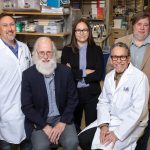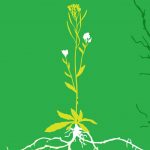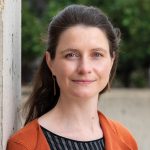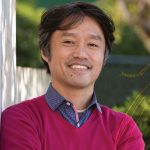In the News The Salk Institute and Lustgarten Foundation form strategic pancreatic cancer research partnership
In the News
Pancreatic cancer is the third-leading cause of cancer deaths in the United States. The National Institutes of Health estimates 60,430 people in the US were diagnosed with pancreatic cancer in 2021, and more than 48,000 are expected to die from the disease.
A new partnership is dedicated to changing those odds.
The Salk Institute has partnered with The Lustgarten Foundation, the world’s largest private funder of pancreatic cancer research, to identify and validate potential targets for new pancreatic cancer drugs. The partnership, supported by a $5 million grant, is part of the Lustgarten Advancing Breakthrough Science (LABS) Program.
Four co-principal investigators, all prominent researchers in the Salk Dedicated Program in Pancreatic Cancer, are leading the effort: Professors Reuben Shaw, Ronald Evans, Tony Hunter and Assistant Professor Dannielle Engle.
“The Foundation’s funding of the Salk Dedicated Program in Pancreatic Cancer is unique because we’re committed to funding preeminent pancreatic cancer scientists focused on a single goal,” says David Tuveson, the Lustgarten Foundation chief scientist, American Association for Cancer Research president and director of the Cold Spring Harbor Laboratory Cancer Center. “Unlike most funding models, Lustgarten LABS gives scientists at leading research institutions the freedom to build the right team and infrastructure to support the kind of high-risk, high-reward studies required to meet the goal.”
In addition to the Salk Institute, the LABS Program includes several other renowned research institutions. Scientists at each of the LABS frequently collaborate, sharing new capabilities and specialized information to further the pancreatic cancer research field and to advance the most promising discoveries in the lab to treat patients in the clinic. The Salk Institute will pursue funding to match the Lustgarten grant of $1 million per year over the next five years.
“We are honored to be the first Lustgarten LAB on the West Coast, which really catalyzes the four participating labs to share common equipment and resources as we bring our individual areas of complementary expertise to bear on the collaborative goal of curing pancreatic cancer,” says Shaw, lead investigator on the grant.
Meet the Salk researchers exploring unique and understudied areas related to diagnosing and treating pancreatic cancer:
Reuben Shaw, director of the Salk National Cancer Institute-Designated Cancer Center, professor in the Molecular and Cell Biology Laboratory and William R. Brody Chair, explores the role of lipid metabolism.
Ronald Evans, professor in the Gene Expression Laboratory and March of Dimes Chair in Molecular and Developmental Biology, investigates transcriptional and epigenetic targets.
Tony Hunter, American Cancer Society Professor in the Molecular and Cell Biology Laboratory and Renato Dulbecco Chair, will continue his renowned exploration of kinase drug targets.
Dannielle Engle, assistant professor in the Regulatory Biology Laboratory, addresses vulnerabilities in glycans, carbohydrates that coat proteins and cells.
Michael Downes, senior staff scientist in the Gene Expression Laboratory, will oversee the central core facility studying changes in pancreatic cancer and developing new models and therapeutic approaches.
Are you up for the challenge?
Featured Stories
 The Salk Institute and Lustgarten Foundation form strategic pancreatic cancer research partnershipSupported by a $5 million grant, the partnership aims to identify and validate potential targets for new pancreatic cancer drugs. Four participating labs, led by Salk Professors Reuben Shaw, Ronald Evans, Tony Hunter and Assistant Professor Dannielle Engle, will bring their individual areas of complementary expertise to bear on the collaborative goal.
The Salk Institute and Lustgarten Foundation form strategic pancreatic cancer research partnershipSupported by a $5 million grant, the partnership aims to identify and validate potential targets for new pancreatic cancer drugs. Four participating labs, led by Salk Professors Reuben Shaw, Ronald Evans, Tony Hunter and Assistant Professor Dannielle Engle, will bring their individual areas of complementary expertise to bear on the collaborative goal. The weed that changed the worldHow Arabidopsis thaliana became one of the most important tools in science—and how the information the small weed has revealed over decades of research now enables the development of Salk Ideal PlantsTM, a new generation of food crops that are better equipped to both thrive in a changing climate and help mitigate it.
The weed that changed the worldHow Arabidopsis thaliana became one of the most important tools in science—and how the information the small weed has revealed over decades of research now enables the development of Salk Ideal PlantsTM, a new generation of food crops that are better equipped to both thrive in a changing climate and help mitigate it. Courtney Glavis-Bloom — Shining the spotlight on aging to find a cure for Alzheimer’s diseaseSenior Staff Scientist Courtney Glavis-Bloom’s work is driven by her experience caring for her grandparents, who were diagnosed with Alzheimer’s disease when she was in high school. She saw firsthand how dementia robs individuals of their connections to the world—now she studies the brain areas affected in aging in the hope of finding a cure.
Courtney Glavis-Bloom — Shining the spotlight on aging to find a cure for Alzheimer’s diseaseSenior Staff Scientist Courtney Glavis-Bloom’s work is driven by her experience caring for her grandparents, who were diagnosed with Alzheimer’s disease when she was in high school. She saw firsthand how dementia robs individuals of their connections to the world—now she studies the brain areas affected in aging in the hope of finding a cure. Helen McRae — Leveraging the body’s own immune response for more effective cancer therapiesHelen McRae was a graduate student when her cousin was diagnosed with lung cancer and received immunotherapy—an approach that empowers a patient’s own immune system to destroy tumors. McRae saw the promise of this newer treatment, but also how much more research is needed to help it work for more people.
Helen McRae — Leveraging the body’s own immune response for more effective cancer therapiesHelen McRae was a graduate student when her cousin was diagnosed with lung cancer and received immunotherapy—an approach that empowers a patient’s own immune system to destroy tumors. McRae saw the promise of this newer treatment, but also how much more research is needed to help it work for more people. Kenta Asahina – Flying into the future of technology and innovationOriginally from Japan, Associate Professor Kenta Asahina grew up exploring nearby farmlands with his two brothers in search of insects and plants. Their dad enjoyed taking them to the mountains and national parks. These experiences inspired his interest in the natural world, and Asahina now studies how genetics impact fruit fly behavior.
Kenta Asahina – Flying into the future of technology and innovationOriginally from Japan, Associate Professor Kenta Asahina grew up exploring nearby farmlands with his two brothers in search of insects and plants. Their dad enjoyed taking them to the mountains and national parks. These experiences inspired his interest in the natural world, and Asahina now studies how genetics impact fruit fly behavior.

















































